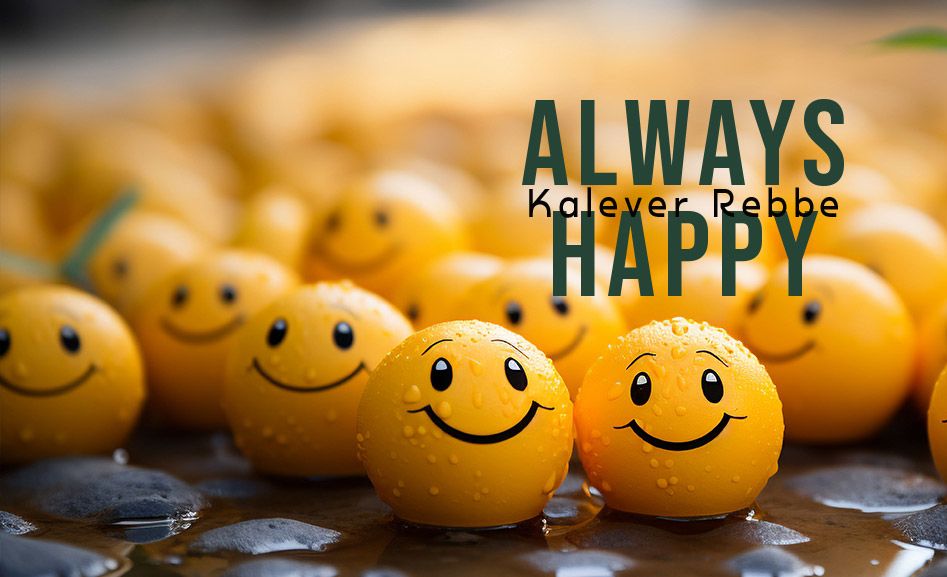
Only With Emuna
Current events can leave us feeling that the world is spinning out of control. What is the proper way to look at these events?

The Fear Factor
Throughout history there have been tragic worlds, from world wars to pandemics, like the one we have been living through for the last two years, that seemed like catastrophes going “out of control”. Whenever such tragedies loom, the world is gripped by fear and anxiety. They feel that this one event might be the end of the world and mankind.
This fear is even more potent nowadays when technology has enabled news to spread at a rapid pace. The media and the social media platforms help fuel this fear, feeding our anxieties. Someone can easily be distracted by this noise slowly eroding their emunah, their faith, to the point where they completely abandon believing in Hashem altogether. They begin believing in the abilities of man. They feel that they control everything. However, when an event proves otherwise, when something happens in this world or in their lives that forces them to face the reality that the world and its destiny are out of their control, they become gripped with fear.
When you feel that happening, when you sense that your emunah is dwindling and being replaced by a false faith in man’s ability to control the world, you should recall the analogy Chazal teaches us about Avraham Avinu (Abraham our Father) and his realization in one God, Hashem.
Demolition Not Destruction
The Midrash Rabba (Breishit 39:1) offers a parable to describe Avraham Avinu: A person was travelling from place to place and came across a palace that was ablaze. Shocked the person asked, “Does this palace not have a caretaker to watch over it?” And a man appeared to this person and said, “I am the caretaker.” So too, Avraham Avinu looked around the world and saw so much destruction, negativity. And, he asked, “Does this world not have a caretaker?” Then, Hashem appeared to him and said, “I am the caretaker of the world.”
This analogy presents the obvious question: if the palace had a caretaker, why would he stand idly by as it burned?
This question forces us to understand the mentality of the caretaker on a much deeper level and, in turn, understand our world more clearly. The caretaker was not standing idly by watching the palace burn to a crisp. In fact, the fire was not destructive at all. It was an intentional fire, a controlled demolition. The caretaker himself was burning a section of the palace to rebuild it. It was not destruction but demolition, clearing the way for a newer, grander palace.
Avraham Avinu looked around his world and saw destruction. He saw a world of natural disasters and tribal wars by the people of the Dor Haflagah. When Avraham Avinu saw all that was wrong in the world, it seemed as if the Creator of the World, Hashem, was not watching over His creation. However, Hashem revealed to Avraham Avinu that all these tragedies, these hardships, the seeming destruction, are all controlled and with exact measure to bring a rectification and purification to the world; to pave a way forward for repairing the world. Nothing was out of control; everything was in Hashem’s control.
Through Faith, We Dispel Fear
This level of understanding, of emunah, can be achieved by someone who clings to the Torah; through his learning Torah he connects in a very deep way to Hashem’s essence. Through his faith, through believing that Hashem oversees this world and controls every outcome, and they are all for the good, this person can expel fear from his life. No harm can befall him, he cannot experience any tragedy or hardship, no one can harm him unless it was the Will of Hashem. Hashem, in a controlled way, places these events in your life for your ultimate good.
We have seen that great Torah scholars were not afraid of anything or anyone. Chovavot HaLavavot (Duties of the Heart) (Gate 10: Chapter 6) relates that one of the pious fell asleep while traveling in the wilderness. And he was asked, “Are you not afraid to sleep here?” To which he answered, “I would be embarrassed before Hashem if I were to fear anything else but Him.”
A wise person understands not to let hardships depress him. He understands that this hardship, this struggle, this pain, also comes from Hashem who loves him.
The Divrei Chaim of Sanz lost his son, R’ Aryeh Leibishel at the young age of seven. On his way back from the funeral, he said: “A person is walking and is suddenly hit on the back. When he turns around to see who hit him, he realizes that it was his dear friend who hit him as a sign of affection of love. He was not hit but received a pat on the back. There is no doubt that even if the person was initially angry, once he realizes who it was, it accepts it with love.” And, the Rebbe continued: “Today I received a brutal blow, but when I contemplated Who sent me this blow, I said to myself, ‘This was from Hashem, Whom I love so dearly. Obviously, I need to accept this with love and joy as well.”
The great tzadikim throughout the generations have taught us that when we find ourselves facing a challenge, or in a place of pain, physical, emotional and spiritual, we have to strengthen our faith, encourage ourselves with the knowledge of where this is coming from. That Hashem only wants our good and welfare. This too will be good in the end, and we need to accept this moment of pain with love and joy. You need to specifically daven for this strength to maintain this perspective, and not to panic or be swallowed by fear.
A yid (Jew) needs to always be learning from the events in his life. At times, a yid experiences clear miracles, he feels Hashem’s Divine Providence. Other times, he might not feel that as clearly. However, when he feels Hashem’s Divine Providence, he must work on building up his ability to always understand that everything in this world comes from Hashem, that everything – good and bad, miraculous and natural – that happens in his life is with an exact and controlled purpose. Hashem is guiding him through the events in his life.
When a yid lives with this reality, he will not be afraid of a potential tragedy. He will not be sad or depressed when difficulties arise.
The Life of Yosef
We see this message clearly in this week’s parsha:
The early years of Yosef’s life was filled with turmoil and tragedy. His brothers threw him into a pit. He was sold into slavery, where he faced incredible spiritual challenges. He succeeded in withstanding those spiritual tests only to find himself in prison for 12 years.
However, in the end, it was clear that each one of those events were guiding and helping Yosef achieve something incredible in the end, becoming the viceroy of Egypt and saving his family from famine. Yosef’s life is the quintessential example of tragedy being transformed into goodness in the end.
After seeing the Divine Providence in his life, Yosef decided to give his sons names that would constantly serve as a reminder of this reality. The verse says (Breishit 41:51): ” And Joseph named the firstborn Manasseh, for “God has caused me to forget all my toil and all my father’s house. And the second one he named Ephraim, for “God has made me fruitful in the land of my affliction.”
Zot Chanukah
The same idea we see during Chanukah:
While things seemed bleak during the times of Chanukah, while the Greeks were controlling the Jewish people, in the end, it was for good, everything was done with Divine Providence.
Therefore, we say on Chanukah the piyut (liturgical poem) “Maoz Tzur” which has a stanza that says, “Bnei Bina” – these are people who understand the deeper reasoning and meaning behind things, and learn from this for other things. “Eight days they established for song.” These wise sages established the holiday of Chanukah for all times to serve as a reminder, that in all situations, Hashem is guiding the outcomes of your life. While there might seem like there is destruction and hardships, those moments are for rebuilding a better future, for improving your life for the best in the long run.
When a yid lives like this, his life will permeate with contentment and joy, without fear and anxiety from world events. He can thrive in the darkness by finding the light.
May every yid continue to strengthen their emunah, to realize that everything is from Hashem and will turn out good in the end. Amen.











Tell us what you think!
Thank you for your comment!
It will be published after approval by the Editor.